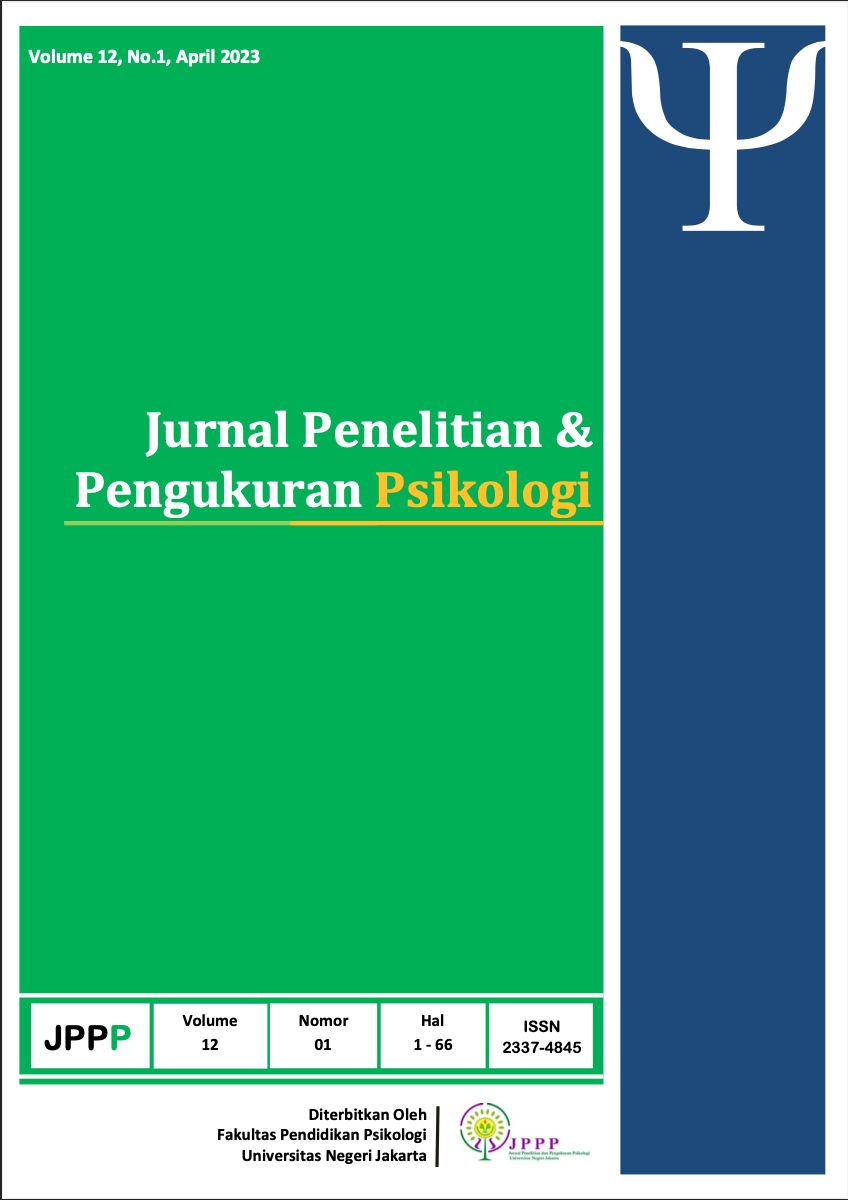Self-Control and Hope Of Academic Success In High School Students
DOI:
https://doi.org/10.21009/JPPP.121.07Keywords:
Self Control; Hope of Academic Success; StudentAbstract
Hope of Academic success is an important theoretical framework to guide students' research and practice in the future. One of the factors that influence hopes is self-control. This study aims to determine the relationship between self-control with high school students' Hope of Academic success. The sample amounted to 106 which is located in SMA Al Islam 1 Surakarta. The results of the analysis of research data showed a correlation coefficient of 0.672 with a significance value of 0.000 (p < 0.05). The results of this correlation can be interpreted that the alternative hypothesis (Ha) that there is a positive relationship between self-control and the expectation of successful high school students' studies can be accepted. The implication of this research is that high school students can apply good self control efforts in order to have hopes of academic success so that the chances of student success in the selection of state universities are high.
References
Averill, J. R. (1973). Personal control over aversive stimuli and its relationship to stress. Psychological Bulletin, 80(4), 286–303. https://doi.org/10.1037/h0034845
Bukchin, S., & Kerret, D. (2020). The role of self-control , hope and information in technology adoption by smallholder farmers – A moderation model. Journal of Rural Studies, January, 0–1. https://doi.org/10.1016/j.jrurstud.2020.01.009
Desnita, & Karneli, Y. (2022). Tingkat Kesiapan Belajar Siswa Smp Terbuka Jakarta Implikasi Pelaksanaan Layanan Bimbingan Konseling. Counsenesia Indonesian Journal Of Guidance and Counseling, 2(02), 106–112. https://doi.org/10.36728/cijgc.v2i02.1462
Dwi Marsela, R., & Supriatna, M. (2019). Kontrol Diri: Definisi dan Faktor. Journal of Innovative Counseling : Theory, Practice & Research, 3(2), 65–69. http://journal.umtas.ac.id/index.php/innovative_counseling
Emda, A. (2018). Kedudukan Motivasi Belajar Siswa Dalam Pembelajaran. Lantanida Journal, 5(2), 172. https://doi.org/10.22373/lj.v5i2.2838
Genç, E., & Arslan, G. (2021). Optimism and Dispositional Hope to Promote College Students’ Subjective Well-being in the Context of the COVID-19 Pandemic. Journal of Positive School Psychology, 5(2), 87–96. https://doi.org/10.47602/jpsp.v5i2.255
Ghozi, S., Suriana, I., & Ramli, R. (2016). Analisis Survey Pilihan Studi Dan Bidang Kerja Lulusan SMA/SMK Di Kalimantan Timur. JST (Jurnal Sains Terapan), 2(2), 107–112. https://doi.org/10.32487/jst.v2i2.183
Hansen, M. J., Trujillo, D. J., Boland, D. L., & Mackinnon, J. L. (2015). Overcoming obstacles and academic hope: An examination of factors promoting effective academic success strategies. Journal of College Student Retention: Research, Theory and Practice, 16(1), 49–71. https://doi.org/10.2190/CS.16.1.c
Harahap, J. Y. (2017). Hubungan Antara Kontrol Diri Dengan Ketergantungan Internet Di Pustaka Digital Perpustakaan Daerah Medan. JURNAL EDUKASI: Jurnal Bimbingan Konseling, 3(2), 131. https://doi.org/10.22373/je.v3i2.3091
Jembarwati, O. (2015). Pelatihan Orientasi Masa Depan Dan Harapan Keberhasilan Studi Pada Siswa Sma. Humanitas, 12(1), 45. https://doi.org/10.26555/humanitas.v12i1.3828
Nalim, Dewi, H. L., & Safii, M. A. (2021). Analisis Faktor-Faktor yang Mempengaruhi Keberhasilan Studi Mahasiswa di PTKIN Provinsi Jawa Tengah. Jurnal Kependidikan, 7(4), 1003–1013.
Pratiwi, M., Wicaksono, L., & Astuti, I. (2020). Analisis kontrol diri siswa pada kelas x smk negeri 03 pontianak. Jurnal Pendidikan Dan Pembelajaran Khatulistiwa, 9(8). https://jurnal.untan.ac.id/index.php/jpdpb/article/view/41843
Pujawati, Z. (2015). Hubungan Kontrol Diri Dan Dukungan Orang Tua Dan Perilaku Disiplin Pada Santri. Psikoborneo: Jurnal Ilmiah Psikologi, 3(3)(3), 321–330. file:///C:/Users/User/Downloads/3789-10085-1-PB.pdf%0Ahttp://e-journals.unmul.ac.id/index.php/psikoneo/article/view/3789/2466
Purnomo, R. A. (2016). Analisis Statistik Ekonomi dan Bisnis Dengan SPSS. In P. C. Ambarwati (Ed.), Cv. Wade Group (1st ed.). CV. Wade Group.
Puspita, M., Erlamsyah, & Syahniar. (2013). Hubungan antara Perlakuan Orang Tua dengan Kontrol Diri Siswa di Sekolah. Jurnal Ilmiah Konseling, 1, 330–337.
Saifuddin, Ahmad. (2020). Penyusunan Skala Psikologi (1st ed). Jakarta: Prenadamedia Group.
Sari, S., Yusri, & Said, A. (2017). Kontrol Diri Siswa dalam Belajar dan Persepsi Siswa terhadap Upaya Guru BK untuk Meningkatkan Kontrol Diri. Jurnal Penelitian Guru Indonesia, 2(1), 32–37.
Sembiring, E. A., & Fauzia, R. (2012). Harapan akan Kesuksesan Perkawinan pada Individu yang Melakukan Perkawinan Semarga pada Suku Batak. BMC Public Health, 1(1), 1–8.
Snyder, C. R. (2002). Hope Theory : Rainbows in the Mind. Psychological Inquiry, 13(4), 249–275.
Snyder, C. R., & Lopez, S. J. (2016). Handbook of Positive Psychology. In The Oxford Handbook of Positive Psychology. https://doi.org/10.1093/oxfordhb/9780199396511.013.1
Snyder, C. R., Rand, K. L., & Cheavens, J. S. (2018). Hope Theory: A Member of the Positive Psychology Family. In The Oxford Handbook of Positive Psychology, (2 Ed.) (Issue May). https://doi.org/10.1093/oxfordhb/9780199399314.013.3
Snyder, C. R., Shorey, H. S., Cheavens, J., Pulvers, K. M., Adams, V. H., & Wiklund, C. (2002). Hope and academic success in college. Journal of Educational Psychology, 94(4), 820–826. https://doi.org/10.1037/0022-0663.94.4.820.
Sugiyono. (2019). Metode Penelitian Kuantitatif Kualitatif dan R&D (2nd ed). Bandung: Alfabeta,







